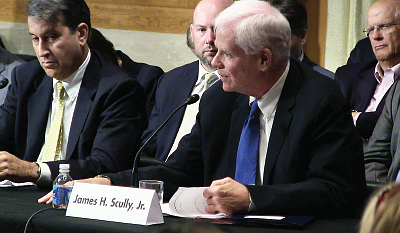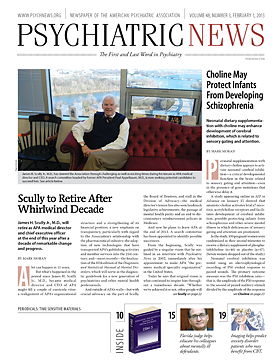A lot can happen in 11 years.
But what’s happened in the period since James H. Scully Jr., M.D., became medical director and CEO of APA might fill a couple of curricula vitae: a realignment of APA’s organizational structure and a strengthening of its financial position; a new emphasis on transparency, particularly with regard to the Association’s relationship with the pharmaceutical industry; the adoption of new technologies that have transported APA’s publishing activities and member services into the 21st century; and—most recently—the finalization of the fifth edition of the Diagnostic and Statistical Manual of Mental Disorders, which will serve as the diagnostic guidebook for a new generation of psychiatrists and other mental health professionals.
And outside of APA’s walls—but with crucial advocacy on the part of Scully, the Board of Trustees, and staff in the Division of Advocacy—the medical director’s tenure has also seen landmark legislative achievements: the passage of mental health parity and an end to discriminatory reimbursement policies in Medicare.
And now he plans to leave APA at the end of 2013. A search committee has been appointed to identify possible successors.
From the beginning, Scully was guided by a singular vision that he outlined in an interview with Psychiatric News in 2002, immediately after his appointment: to make APA “the premiere medical specialty organization” in the United States.
Today he says that original vision is what continued to inspire him throughout a tumultuous decade. “Whether we’ve achieved it or not, other people will have to say, but what always drove me was the idea that someone might say, ‘if you want to know what a great membership organization looks like, go look at APA,’ ” he said.
‘APA Today Is Sound and Stable’
“I hope that we have reaffirmed that APA is a member-centered organization—data driven but member oriented—that looks after the entire profession of psychiatry and serves as a voice for its members,” Scully told Psychiatric News. “APA’s greatest strength has always been its staff, and I’ve been honored to lead them. It’s to the credit of the APA staff that I think we can confidently say, even if there is always room to improve, that APA today is sound and stable.”
Scully came to the medical director’s office from the University of South Carolina School of Medicine, where he had been the Alexander G. Donald Professor and chair of the Department of Neuropsychiatry and Behavioral Science. But he was not new to APA, having served as a deputy medical director of APA and director of its Office of Education from 1992 to 1996.
Past APA President John Oldham, M.D., told Psychiatric News that APA and its members can be grateful for Scully’s presence in the medical director’s office.
“As CEO and medical director of APA, Jay has provided superb leadership,” said Oldham. “I could not have succeeded in my year as president without Jay as an invaluable partner, who was always available. Behind the scenes and in front of the scenes, Jay has been the steady voice of APA—through good times and when times have been tough. He is widely recognized and respected in the entire field of medicine, and we owe him a huge debt of gratitude for all that he has done for APA.”
When Scully took over APA, the organization was facing serious financial challenges, not different from those facing the nation as a whole today. As Scully put it simply, “We were spending more than we were taking in.”
So fiscal discipline was a first order of business. “I told staff that we needed to be clear about how we spend the members’ money,” he said. “We dedicated ourselves to giving senior management the best possible information about where the organization was in terms of revenue so we could get the most out of the dollars we were spending.”
The nationwide financial crisis of 2008 was a temporary setback, and Scully noted that the loss of an exclusive malpractice insurance offering that same year resulted in a loss of members. “It may be slow, but I am confident we will get those member numbers back up,” he said.
Because of subspecialization and other issues, membership has been a prevailing concern for all medical membership societies, and APA is no exception. “It’s an ongoing concern that we have the right balance of dues and member services, and that’s something we are always looking at,” he said. “Along with the wider society, we have an aging membership, and we need to think about a younger generation of tech-savvy psychiatrists. What do they need out of a medical society that we can provide—even if it means doing things differently from how we’ve done them in the past?”
Communications Upgrades Enacted
The world of communications has radically changed during my tenure—that’s not specific to APA but has been a worldwide phenomenon,” he continued. “APA has gotten more technologically oriented with our communications, our electronic journals have more information than the printed versions, and the new DSM-5 will have electronic components for members using electronic health records. And we do more and more online webinars for our members.”
The electronic revolution is not the only storm that brewed outside APA’s walls. Possibly the single most important issue to become prominent during Scully’s tenure—one that has convulsed the entire field of medicine—is public concern about financial relationships between medicine and the pharmaceutical and device industries.
In the popular media and on Capitol Hill—where Sen. Charles Grassley (R-Iowa) undertook a series of hearings on the topic—psychiatry was sometimes singled out. “We have always tried to be transparent,” Scully said. “And what was frequently lost is that we were often commended by external accrediting agencies for the way we have managed our relationships with industry.”
But it was clear that professional medical societies of all types were in for change. In April 2009 Scully co-wrote an article in the Journal of the American Medical Association titled “Professional Medical Associations [PMAs] and Their Relationships With Industry: A Proposal for Controlling Conflict of Interest,” arguing that integrity and the maintenance of public trust were of overriding importance. “To maintain integrity, sacrifice may be required. Nevertheless, these changes are in the best interest of the PMAs, the profession, their members, and the larger society,” the article concluded.
‘No Other Group Does What We Do’
That year APA eliminated industry-supported symposia at its annual meetings, a move that was not without financial pain. “The Board and I agreed that we needed to make some changes even if they entailed real cost to us in lost revenue,” Scully told Psychiatric News. “Part of our core mission is to make sure our members get the highest-quality information as a part of their continuing medical education. Having a relationship with industry to obtain this is not core.”
There were real and lasting victories on Capitol Hill too—most notably the historic passage of the Wellstone-Domenici Mental Health Parity and Addiction Equity Act of 2008 and the elimination of discriminatory copayments for mental health treatment in the Medicare program. APA’s leadership in those legislative efforts was critical, as was the organization’s partnership with the AMA; the latter partnership has resulted in former APA Assembly Speaker Jeremy Lazarus, M.D., being only the third psychiatrist president of the AMA in its history.
As for what’s next for APA’s retiring medical director, Scully says he’s keeping his options open. He’ll return to his home state of South Carolina, where he may serve as voluntary faculty at the University of South Carolina School of Medicine; and he looks forward to a term as president of the American College of Psychiatrists.
Scully will leave behind an APA stronger than he found it when he became medical director 11 years ago, and one that is poised to face the future.
“We are the voice of psychiatry,” he said. “No other group does what we do. If APA is not successful, psychiatry will not be successful.” ■


